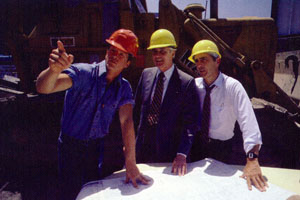Who's in Charge Anyway?

So you start your project with a pre-construction meeting, with everybody meeting everyone. As your firm's PM, you tell your client's people that you will be their single point of contact for any documents that they find necessary to send. The "other guy" - your PM contemporary from the client's side - lets you know that it works the same way for him. This is good; things are off to a nice start.
After all of the client's questions are asked and (hopefully) answered or addressed, it's your turn. If you're a good Full Contact PM, then you'll want to ask a few questions, possibly like these:
- In the event there is a change of conditions and something isn't covered in our scope of work, we'll normally send the PM a RFI and ask what we are supposed to do. We don't want to do any extra work without first getting written direction from your PM. Are you okay with this procedure?
- Sometimes these changes affect what we are currently doing. On these urgent RFIs, how long will it take you to answer them?
- If we are instructed by you to make a change, we'll send you a change order request. How long will it normally take your staff to turn around a change order request and give us an actual change order we can bill against?
The point here is that we are "setting the table," if you will. We want everyone to know, up front, that we will deal professionally when it comes to running this project, and act promptly when it comes to change order work. This is also very positive for both sides: they realize that you won't go around performing a bunch of unapproved extra work, with the expectation or hope of getting it approved later. You have their best interests at heart. Likewise, they now know that you are unlikely to do a bunch of extra work for free, because you are a professional, and you have a process to handle these things.
So far, so good. Let's put it into play, and see how it goes. Let me give you an example:
One time, on a school project of mine, we had only been on the job a few days when something came up. I sent a RFI to the project's architect, because the owner designated him as the single point of contact. I asked the architect some kind of a question that went beyond dimensions and drawings - it had to do with constructability of the project, like a temporary roadway that would not support the weight of the equipment traveling over it.
As it turned out, this architect - the single point of contact, the PM, the owner's representative - did not want to field this question. All of a sudden, he didn't want to lead anymore - didn't really want to be the PM! At least, so it seemed to me. He actually wrote me back the response to my RFI that he did not want to take the responsibility for answering the RFI! What could I do? What did I do? More importantly, what would you do?
I'll tell you what I did, which is also what any good Full Contact PM would have done: I sent him another RFI!
Here's the thing, team. Realize that, in some situations, you actually hold the better hand of cards. Too often we think that the other guy is in charge. We remember the old saying, "He who has the gold makes the rules." True enough, but every rule has its exceptions - sometimes we have some gold of our own.
And this time, I had some. (And you have some, as well, if you only remember to look in your pockets and find it.) At this point in time, what was the one thing this architect wanted even more than not answering my RFI? He wanted the project to continue with no delays. And there's your gold.
As a PM, the one thing you never run out of is RFIs! Your construction manager may answer your RFI with some kind of an inane, inaccurate and inappropriate comment. But he will eventually answer it. And if the answer is not clear enough, doesn't give you the direction you need, or tell you how to proceed, then you have every right to ask for another response.
In my case, I reminded the architect that he was the designated point of contact and that he had to answer the RFI. I also told him, again, that if he didn't, it would cause the project to be delayed due to certain conditions not disclosed in the bidding documents. And then I asked him the question again. Finally, he provided the answer (and a few more dollars), and we moved on.
You're thinking, "Hey, Coach, how come this works so well for you? Nobody else talks about doing things this way."
Sometimes the riskiest strategy in the game is to not play your best hand and to fold instead. The unfortunate thing here is that it is your company that takes over the risk, assumes costs not of your making, or bears a burden that belongs to others. I prefer that my company not adopt this strategy, so we generally don't. And you don't have to, either.
Sometimes you need to provide leadership on the project. Sometimes you need to help the other guy learn to lead, as well. And sometimes you can take all of that to the bank!
About the Author
Gary Micheloni is a working project manager, speaker, author, consultant and coach. He has severals years of industry experience, including a background as a licensed general engineering contractor. For further information and insight on the Full Contact Project Management approach, write Coach Gary at FullContactTeam@gmail.com.
Copyright © 2006, Gary Micheloni and Full Contact Project Management


















